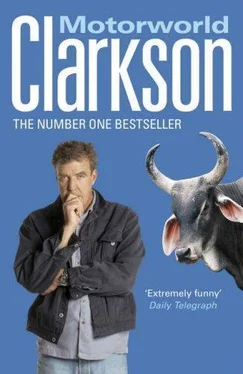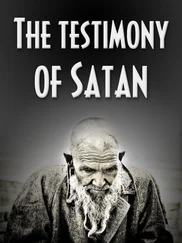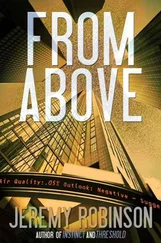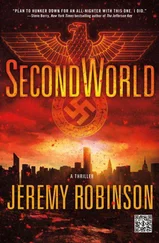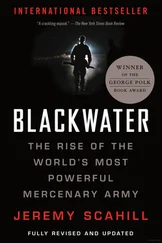Jeremy Clarkson - Motorworld
Здесь есть возможность читать онлайн «Jeremy Clarkson - Motorworld» весь текст электронной книги совершенно бесплатно (целиком полную версию без сокращений). В некоторых случаях можно слушать аудио, скачать через торрент в формате fb2 и присутствует краткое содержание. Город: London, Год выпуска: 2004, ISBN: 2004, Издательство: Penguin, Жанр: Прочая документальная литература, Юмористическая проза, на английском языке. Описание произведения, (предисловие) а так же отзывы посетителей доступны на портале библиотеки ЛибКат.
- Название:Motorworld
- Автор:
- Издательство:Penguin
- Жанр:
- Год:2004
- Город:London
- ISBN:978–0–141–90136–7
- Рейтинг книги:5 / 5. Голосов: 1
-
Избранное:Добавить в избранное
- Отзывы:
-
Ваша оценка:
- 100
- 1
- 2
- 3
- 4
- 5
Motorworld: краткое содержание, описание и аннотация
Предлагаем к чтению аннотацию, описание, краткое содержание или предисловие (зависит от того, что написал сам автор книги «Motorworld»). Если вы не нашли необходимую информацию о книге — напишите в комментариях, мы постараемся отыскать её.
Motorworld — читать онлайн бесплатно полную книгу (весь текст) целиком
Ниже представлен текст книги, разбитый по страницам. Система сохранения места последней прочитанной страницы, позволяет с удобством читать онлайн бесплатно книгу «Motorworld», без необходимости каждый раз заново искать на чём Вы остановились. Поставьте закладку, и сможете в любой момент перейти на страницу, на которой закончили чтение.
Интервал:
Закладка:
Used primarily as taxis, these three-seater subcontinental Robin Reliants are pretty much invisible to all other road users. Crush someone’s goat and the villagers will lynch you. Destroy an auto-rickshaw and nobody seems to notice.
I know this because I drove one. I was on a main road, seeing if it really was true that it could do 40 mph, when a car just pulled out of a side turning in front of me. Luckily, I was able to stop, but the truck behind just kept on coming. He didn’t brake, he didn’t attempt to swerve and he was going to flatten me unless I got going again right away.
If other road users don’t get you in a rickshaw, the potholes will. If you don’t see them coming, the first indication that you’ve been over a bump comes when your spine snaps.
But even if you can avoid all the other traffic and the potholes, there’s another nasty in store. Cancer.
All of India’s cities are polluted but Calcutta has to be seen to be believed — not that you can see it. A spokesman for the World Health Organisation said they’d stopped listing cities in order of environmental risk because the press just latched on to one place, labelling it as the dirtiest place on earth and ignoring the fact that a hundred other places were very nearly as bad.
But he did say, unofficially, that Calcutta is in a league of its own.
Officially, the real reason for the all-pervading smoke is that everyone cooks on open fires, but that’s nonsense. The fault lies fairly and squarely with the diesel engine.
It’s an inefficient fuel at the best of times, smoky and carcinogenic, but mix it with badly maintained motors and you simply would not believe the result. Every car in Calcutta is a Hindustan and every one belches a poisonous cocktail which has blackened the buildings and reduced visibility to just a hundred yards or so. The visibility at midday was exactly the same as it was at midnight.
I was there three days and it was like the hayfever attack from hell. My eyes streamed, my nose ran and it tasted like I’d been sucking boiled sweets made from crude oil.
Calcutta had two other drawbacks, too. First, every single patch of green was covered with cricketers 24 hours a day.
And second, the producer stepped in some human excrement which someone had left on the pavement, and it splashed all over his jeans. That was bad enough but the hotel laundry then ironed creases in them, rendering them useless.
Calcutta is shit.
Madras is not.
It was in Madras that I took part in the Blind Man’s Rally, a charity do where able-sighted drivers chauffeur blind navigators on a day-long treasure hunt.
The car was an awful Maruti Jeep, I had never been to Madras before and my navigator had the worst BO in the history of the world. Things were bad and they got worse when I saw the instructions.
They were in Braille, which my instructor could read, but the Braille was in English, which he could not understand.
So, at every junction, he would spell out, letter by letter, what it said. Or rather, what he thought it said. His fingers would dart over the paper and then he’d look up with a pleased smile on his face and say, ‘Y-J-R-R-U-V.’ Well I know I didn’t go to university but I’m pretty damn sure that is not a word. And nor was I-I-J-V-V-K-O-Y-Y. And nor, indeed, were any subsequent attempts.
We were helped by the man’s astonishing knowledge of Madras which meant that, at any given point, he knew exactly where we were. But at the same time, we were hindered hugely by the fact that neither of us knew where we were supposed to be.
Madras is not an especially big city but by some miracle, we managed to miss every single one of the fifteen checkpoints. We also lost the crew, who were supposed to be filming our attempts. And we were so late back, dinner was finished.
But that said, when I’m on my deathbed and someone asks me which day I would most like to relive, it would be that one. I laughed more at that endless stream of letters than I did when I once saw Lord Longford fall over.
This is the point with India. If you can ignore the very obvious poverty, the leprosy and their staggering inability to drive motor vehicles, it is a funny place.
And we have America to thank for that. Whereas the superpower’s tentacles have infiltrated pretty well every other country on earth to the point that, even in Peking, people know of Bruce Springsteen, India is clean.
You can buy a Big Mac in Reykjavik and listen to Australian disc jockeys talking about what’s coming up ‘this hour’.
But in India, I could find nothing that would remind Wilbur or Myrtle of home. India is a larger, hotter version of Britain circa 1950.
They have inherited our love affair with bureaucracy, our legal system and, best of all, our figures of speech from a bygone age.
When driving past the railway station in Bombay — a building the Americans would call impressive, or cool — I asked my taxi driver what it was. ‘From British days,’ he said. ‘Most odd and solid.’
Later, another taxi driver described the mosque in the middle of the bay as ‘most sturdy and spiffing’. This was fantastic.
But it paled into insignificance alongside the message you find on the label of a bottle of Kingfisher beer. It says ‘most thrilling chilled’. Isn’t that just wonderful?
The Americanisation of the English language just hasn’t happened on the subcontinent so that when you pick up a newspaper there, it appears to have been written by Mr Grayson and Mr Cholmondley-Warner.
Just 10 per cent of the nation actually speaks English but it is English, not American, and anyway, 10 per cent of the Indian population equates to very nearly one hundred million people.
And seemingly each one of them queued up each night, in the bars and nightclubs and restaurants to tell us that every educated Indian has a love–hate relationship with the old Motherland. They hate us for having been there but are grateful that it was us, and not the Spaniards or the Germans.
I was told by one, ‘The British had a habit of raping a country, of taking what they wanted, but at least they never tried to reshape the people who lived there. They left us alone to get on with life. We like that. And you did give us cricket.’
We gave them more than that. We also gave them the Morris Oxford, which they turned into the Hindustan Ambassador, and more recently, the Rover SD1. It was actually built there to avoid a massive import duty, but even though there were only two other types of car on the market it failed spectacularly.
Like cricket, it was complicated, boring and prone to stopping every time it looked like rain, but worse, it was expensive. To fill it up with petrol, for instance, you’d have needed 2,000 rupees, which is twice what the average Indian earned in a year.
Amazingly though, the Indians still haven’t given up with us. Indeed, when a British Airways 747 pulls up to the gate at Bombay airport, the entire ground crew come outside to welcome it.
The trouble is that in the 1930s, a quarter of all Rolls-Royces ended up in India and most were subsequently customised with jewelled headlamps, ivory-plated doors and tigerskin seats. They’re still out there too, reminding the people that Britain is a byword for luxury.
That’s why, when they were looking for a new car to build, they turned to Rover, who have just sold them all the tools to make the Montego. Today, there are twenty different types of car in India but the turbo diesel Austin will be by far the most expensive at £20,000 a go.
Expensive when you think that you must give way at junctions to vans and buses, but there you go.
On the last night of my stay in India I took a long stroll down the beach in Bombay and watched the sun slipping into the sewage they call an ocean. I saw kids kicking ponies, women urinating on the sand and people whose begging life had stopped when leprosy took their arms.
Читать дальшеИнтервал:
Закладка:
Похожие книги на «Motorworld»
Представляем Вашему вниманию похожие книги на «Motorworld» списком для выбора. Мы отобрали схожую по названию и смыслу литературу в надежде предоставить читателям больше вариантов отыскать новые, интересные, ещё непрочитанные произведения.
Обсуждение, отзывы о книге «Motorworld» и просто собственные мнения читателей. Оставьте ваши комментарии, напишите, что Вы думаете о произведении, его смысле или главных героях. Укажите что конкретно понравилось, а что нет, и почему Вы так считаете.
